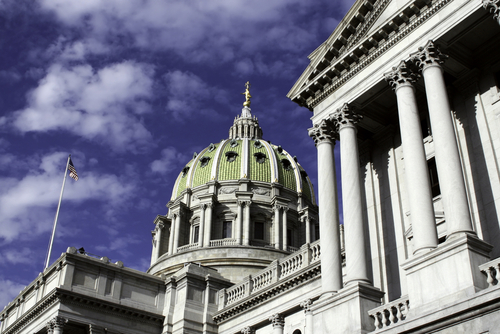
Pennsylvania Gov. Josh Shapiro on Thursday signed into law the main part of a $45.45 billion budget for fiscal year 2023-24, ending a month-long impasse that will prevent interruptions to many critical services.
However, Senate Republicans said that certain programs will still require enabling language before funding can be released. Nearly $1.1 billion of the General Appropriations Budget requires implementation language.
Shapiro ultimately line-item vetoed $100 million allocated for the Pennsylvania Award for Students Success (PASS) scholarship program, a private school voucher program that Republicans had strongly advocated for but that lacked support from Democrats.
“Today is a good day for Pennsylvania taxpayers because we have ensured certain programs and initiatives will not be funded without further action by the General Assembly,” Senate Majority Leader Joe Pittman (R-41) said. “The General Appropriations Bill advanced by the Senate is a significant part of our overall budget process, but it needs to be emphasized that is it one piece of a multipiece puzzle to put a comprehensive budget in place for our commonwealth.”
The governor said the budget makes historic investments in children’s education, supports businesses by cutting through red tape and speeding up permitting, helps older adults stay in their homes, protects and strengthens communities, and ensures that law enforcement and first responders have the resources they need.
The governor also signed into law on Friday a bill to expand the Property Tax/Rent Rebate program to nearly 175,000 more Pennsylvania seniors and nearly double rebates for many of the 400,000 Pennsylvanians who already qualify – delivering the largest targeted tax cut for seniors in nearly two decades.
Senate Appropriations Committee Chair Scott Martin (R-13) said the budget will fund important programs and will ensure critical state funding can be distributed to counties, schools, service providers and other key programs throughout the state. “Our goal remains to complete a fiscally responsible budget without creating disruptions in the lives of the people we represent,” Martin said.
Sen. Elder Vogel, Jr. (R-47) said the Senate’s budget represents three quarters of what Shapiro had asked for.
“What the governor has received today encompasses 75 percent of the total budget package and showcases record investments we have made to support our students, our seniors, our police, and many others to ensure they receive the assistance they need,” Vogel said. “While this can be seen as a step in the right direction, we still are awaiting House action on Pennsylvania’s Fiscal Code which makes up the last 25 percent of the budget. Until we receive and approve of that code bill only then will Pennsylvania’s budget impasse cease.”
House Republican Leader Rep. Bryan Cutler (R-Lancaster) said the budget process had “broken trust among elected officials.”
“What remains truly disappointing about this year’s state budget process is the opportunity that has been missed to work across the aisle to achieve something truly substantial for Pennsylvania’s students and families,” Cutler said. “Instead, we are left with broken trust among those sent to Harrisburg by Pennsylvanians expecting their interests to be put first.”
Cutler pointed the finger of responsibility at Democrats in the House of Representatives.
“Even though the Senate is making the decision to advance the General Appropriations Act today to avoid financial strain on many who depend on state government, the single point of failure in this budget remains the majority-fluid House Democratic leadership who essentially vetoed a good faith and bipartisan budget agreement between Gov. Josh Shapiro and the Pennsylvania Senate to immediately help Pennsylvania students hopelessly trapped in failing schools,” Cutler stated.
With the recent resignation of a member of the House, that chamber now stands deadlocked with an even number of Republicans and Democrats.